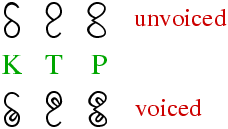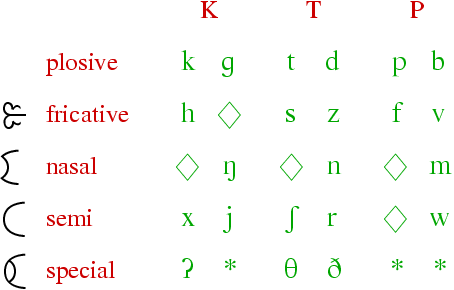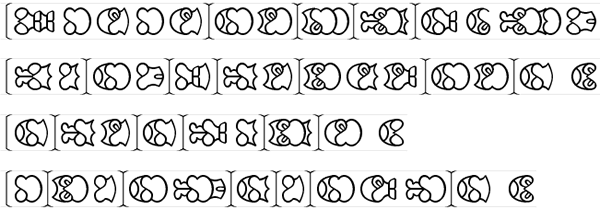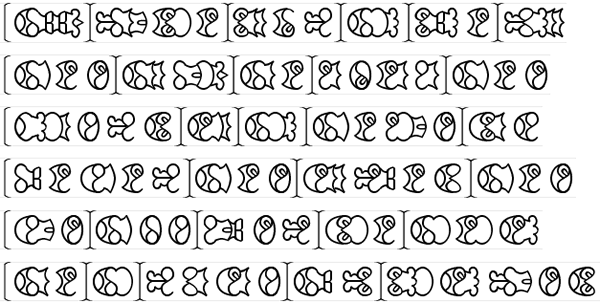The Maui script was invented by Ian James as an alternative way of writing Pacific languages such as Maori. It is a kind of syllabary where syllables are assembled phonetically from parts, and made to form distinct, singular forms. There is also a sense of the third dimension in the syllabic shapes, and they look a little like carved beads.
The Maui script is named after the great god-hero of Maori mythology, who - among other things - pulled New Zealand out of the ocean on the end of his fishing line. There is a suggestion of small marine animals or plants in the shapes of the assembled syllables, as things Maui himself may have shaken off his line. There is also an aesthetic perhaps reminiscent of the Easter Island script (Rongorongo), or the more complex Mayan glyphs.
Nearly all syllables have a region of consonantal onset, one of three represented by the central voluted shape:

There is a rough match here to velar, dental and labial regions respectively.
In front of this shape, a modifier is attached to specify more clearly which consonant is being used. Absence of a modifier implies a plosive.

Here, the diamond indicates lack of a useful phoneme in this particular rendition. The asterisk indicates a non-phonemic glyph, shown below. A language may arrange the modifier table differently to the way it is here, to make better use of the three-fold space. One example might use the unvoiced nasals to signify non-phonemic elements, and use the "special" modifier for other phonemes.
The vowel shapes simply attach to the right of the assembled consonant. Multiple vowels can attach in series; this is a common effect in Maori, for example. Also, having /l/ and approximant /r/ among the vowels means we needn't break the syllable for these smooth sounds.

Shown here are the 3 non-phonemic glyphs, as well as glyphs for special phonemic situations. The vowel-like phonemes /l/ and approximant /r/ may start a syllable, and are then given the modifier shown here. Other vowel-initial syllables would use the glottal plosive consonant as onset ("special unvoiced K"). For syllabic patterns other than the simple CV of Pacific languages, most modified consonants can be written without a vowel. Except for plosives, which use the closed oval forms given here (voicing marks may also be drawn on these to make solo or final /g/, /d/ and /b/).


Pookarekare ana ngaa wai o Waiapu;
whiti atu koe hine marino ana e.
E hine e hoki mai ra;
ka mate ahau i te aroha e.
Maori love song

All human beings are born free and equal in dignity and rights.
They are endowed with reason and conscience and should act towards
one another in a spirit of brotherhood.
(Article 1 of the Universal Declaration of Human Rights)
Contact regarding the author's various script systems can be made via email: ianrjames at hotmail dot com.
Akkhara Muni, Amethyst, Bostani, Elektrum, Fontok, Klaekson-Zaen, Maui, New Akha, New Maori, New Mong, Pranish, SIGIL, Sigil Panel Script, Slinseng-Fi, Tengwar for Scottish Gaelic, Xylphika
See also: http://www.skyknowledge.com/orthographies.htm
Constructed scripts for: Ainu | Arabic | Chinese languages | Dutch | English | Hawaiian | Hungarian | Japanese | Korean | Lingala | Malay & Indonesian | Persian | Tagalog / Filipino | Russian | Sanskrit | Spanish | Taino | Turkish | Vietnamese | Welsh | Other natural languages | Colour-based scripts | Tactile scripts | Phonetic/universal scripts | Constructed scripts for constructed languages | Adaptations of existing alphabets | Fictional alphabets | Magical alphabets | A-Z index | How to submit a constructed script
[top]
You can support this site by Buying Me A Coffee, and if you like what you see on this page, you can use the buttons below to share it with people you know.

If you like this site and find it useful, you can support it by making a donation via PayPal or Patreon, or by contributing in other ways. Omniglot is how I make my living.
Note: all links on this site to Amazon.com, Amazon.co.uk
and Amazon.fr
are affiliate links. This means I earn a commission if you click on any of them and buy something. So by clicking on these links you can help to support this site.
[top]